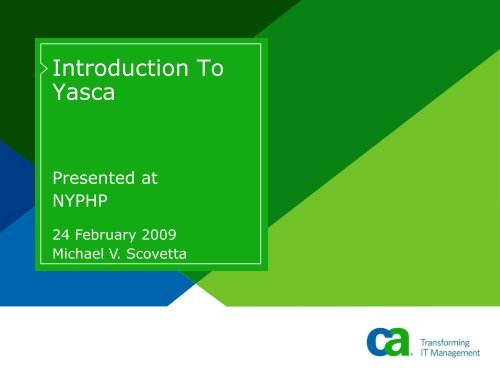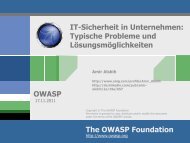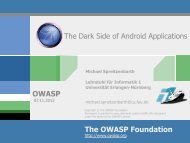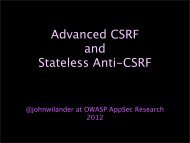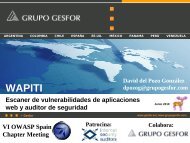Introduction to Yasca - Scovetta.com!
Introduction to Yasca - Scovetta.com!
Introduction to Yasca - Scovetta.com!
You also want an ePaper? Increase the reach of your titles
YUMPU automatically turns print PDFs into web optimized ePapers that Google loves.
<strong>Introduction</strong> To<br />
<strong>Yasca</strong><br />
Presented at<br />
NYPHP<br />
24 February 2009<br />
Michael V. <strong>Scovetta</strong>
2<br />
Agenda<br />
• Who Am I?<br />
• What is <strong>Yasca</strong>?<br />
• How does it work?<br />
• Requirements<br />
• How should I use it?<br />
• The Future of <strong>Yasca</strong><br />
• Demonstration<br />
• Questions?
Who Am I?<br />
• Development<br />
• CA ~2002<br />
• Perl, Java, PHP<br />
• Information Security<br />
• UBS ~2005<br />
• Security Consulting<br />
• Cigital ~2008<br />
• Architecture<br />
• CA ~2008<br />
3
4<br />
What is <strong>Yasca</strong>?<br />
• <strong>Yasca</strong> started as a set of perl scripts that grepped<br />
through source code looking for XSS vulnerabilities.<br />
• <br />
• <br />
• Then I needed <strong>to</strong> do multi-line searches:<br />
• String s = request.getParameter("foo");<br />
out.println(s);<br />
• As I wrote more rules, I found other scanners that<br />
already had many of them.<br />
• So I made calls out <strong>to</strong> them.<br />
• Then everything got nasty and I wrote it all from<br />
scratch again in PHP.
5<br />
What is <strong>Yasca</strong>?<br />
• <strong>Yasca</strong> is an open-source <strong>to</strong>ol that can help you<br />
analyze program source code.<br />
• It leverages several static analysis <strong>to</strong>ols.<br />
• PMD (http://pmd.sourceforge.net/)<br />
• J-Lint (http://artho.<strong>com</strong>/jlint/)<br />
• Pixy (http://pixybox.seclab.tuwien.ac.at/pixy/)<br />
• FindBugs (http://findbugs.sourceforge.net/)<br />
• It can be used <strong>to</strong> scan virtually any file type, not<br />
only traditional source code.<br />
• <strong>Yasca</strong> is written in <strong>com</strong>mand-line PHP and released<br />
under the BSD license.
How Does it Work?<br />
• Architecture based on plug-ins.<br />
• "Major Plug-in" => calls another <strong>to</strong>ol <strong>to</strong> do the scan<br />
• e.g. PMD, J-Lint, FindBugs, Pixy, Grep<br />
• "Minor Plug-in" => uses embedded logic<br />
• Relatively easy <strong>to</strong> write, extremely flexible<br />
Plug-in<br />
Plug-in<br />
Plug-in<br />
<strong>Yasca</strong><br />
Report<br />
Genera<strong>to</strong>r<br />
Output<br />
/tmp/my_source_code<br />
6
How Does it Work<br />
• <strong>Yasca</strong> has plug-ins capable of scanning many file<br />
types, including Java, C/C++, PHP, COBOL, ASP,<br />
JavaScript, HTML, CSS, and Visual Basic.<br />
• A special plugin (Grep) is designed <strong>to</strong> make new<br />
rules extremely easy <strong>to</strong> write.<br />
• Just define a regular expression, the file types it's<br />
applicable <strong>to</strong>, and a name for your rule and drop it in<br />
the "plugins" direc<strong>to</strong>ry.<br />
• An example will follow.<br />
7
Requirements<br />
• <strong>Yasca</strong> has few base requirements:<br />
• PHP (Windows binaries included)<br />
• Java 1.5 (for PMD, FindBugs, and Pixy)<br />
• <strong>Yasca</strong> has been tested on Windows XP, Vista,<br />
and a few flavors of Linux.<br />
• If you find bugs or in<strong>com</strong>patibilities, please let<br />
me know!<br />
• scovetta@users.sourceforge.net<br />
8
How Should I Use It?<br />
• <strong>Yasca</strong> can be used in a number of different<br />
ways, including as a:<br />
• checkpoint within a formal SDLC<br />
• desk<strong>to</strong>p <strong>to</strong>ol for developers<br />
• <strong>to</strong>ol integrated in<strong>to</strong> a source code reposi<strong>to</strong>ry<br />
• In its current form, <strong>Yasca</strong> is best suited for use<br />
as a developer <strong>to</strong>ol.<br />
• i.e. run <strong>Yasca</strong> each week on your code base.<br />
9
The Future of <strong>Yasca</strong><br />
• Future versions of <strong>Yasca</strong> may include the<br />
following features:<br />
• "diff" -- <strong>com</strong>pare last week's results <strong>to</strong> this week's<br />
• data flow analysis / taint propagation<br />
• Program Query Language<br />
• http://pql.sourceforge.net/<br />
• Central results reposi<strong>to</strong>ry<br />
• More information is available on the OWASP<br />
Project Page:<br />
• http://www.owasp.org/index.php/Category:OWASP_<strong>Yasca</strong>_Project_Roadmap<br />
10
Demonstration<br />
[root@ardonis yasca]# ./yasca<br />
<strong>Yasca</strong> 1.2 - http://yasca.sourceforge.net - Designed & Developed by Michael V. <strong>Scovetta</strong><br />
Usage: yasca [options] direc<strong>to</strong>ry<br />
Perform analysis of program source code.<br />
--debug<br />
additional debugging<br />
-h, --help<br />
show this help<br />
-i, --ignore-ext EXT,EXT ignore these file extensions<br />
(default: exe,zip,jpg,gif,png,pdf,class)<br />
--ignore-file FILE ignore findings from the specified xml file<br />
--source-required only show findings that have source code available<br />
-f, --fixes FILE<br />
include fixes, written <strong>to</strong> FILE (default: not included)<br />
(EXPERIMENTAL)<br />
-s, --silent<br />
do not show any output<br />
-v, --version<br />
show version information<br />
Examples:<br />
yasca c:\source_code<br />
yasca /opt/dev/source_code<br />
yasca -o c:\output.csv --report CSVReport "c:\foo bar\quux"<br />
[root@ardonis yasca]#<br />
11
Demonstration<br />
[root@ardonis yasca]# ./yasca resources/test<br />
<strong>Yasca</strong> 1.2 - http://yasca.sourceforge.net - Designed & Developed by Michael V.<br />
<strong>Scovetta</strong><br />
Initializing <strong>com</strong>ponents...<br />
Starting scan. This may take a few minutes <strong>to</strong> <strong>com</strong>plete...<br />
Forking external process (FindBugs)...<br />
External process <strong>com</strong>pleted...<br />
Forking external process (PMD) for ./plugins/default/pmd/yasca.xml...<br />
External process <strong>com</strong>pleted...<br />
Forking external process (PMD) for ./plugins/default/pmd/yasca-rules.xml...<br />
External process <strong>com</strong>pleted...<br />
Creating report...<br />
Results have been written <strong>to</strong> /root/Desk<strong>to</strong>p/<strong>Yasca</strong>/<strong>Yasca</strong>-Report-20090127013827.html<br />
[root@ardonis yasca]#<br />
12
13<br />
Demonstration<br />
• Source Code Context (lines before/after finding)<br />
• Problem description<br />
• Proposed fix (where applicable)<br />
• Add finding <strong>to</strong> the ignore list
14<br />
Writing a Simple Rule Using the Grep Plug-in<br />
• Problem: Management believes that developers<br />
have been embedding social security numbers<br />
directly in source code.<br />
• Solution: Use <strong>Yasca</strong> and the 'Grep Plug-in' <strong>to</strong><br />
scan all source code files for social security<br />
numbers.
Demonstration<br />
[root@ardonis yasca]# less ./plugins/default/grep/SSN.grep<br />
name = Social Security Number Found in Source Code<br />
file_type = JAVA, php, NET, HTML<br />
grep = /[^\d]\d{3}\-\d{2}\-\d{4}[^\d]/<br />
category = Compliance: Sensitive Data<br />
category_link = http://en.wikipedia.org/wiki/Social_security_number<br />
severity = 1<br />
description =<br />
Social security numbers should never be embedded in program source<br />
code.<br />
END;<br />
15
Questions?<br />
16
Thank You!<br />
• This presentation will be posted on<br />
www.yasca.org <strong>to</strong>night.<br />
• Please send <strong>com</strong>ments, feedback, bug reports,<br />
feature requests, questions, etc. <strong>to</strong>:<br />
• scovetta@users.sourceforge.net<br />
• Thank you for listening!!<br />
17


